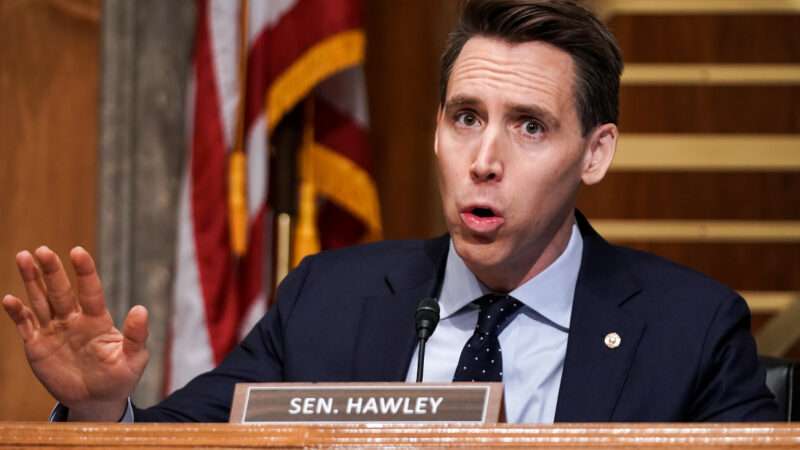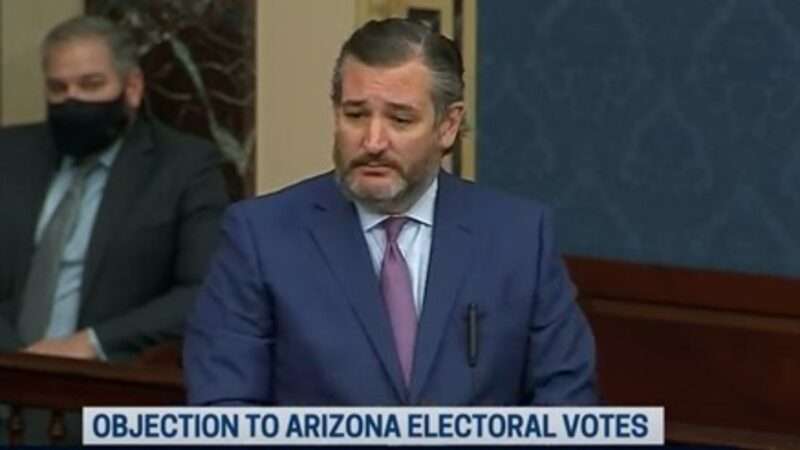
I wrote last year that Sen. Josh Hawley (R–Mo.) is the ultimate Karen. Out of touch with reality and combative when he doesn’t get his way, the senator’s short tenure in federal government has been infused with classic Karen-esque trademarks. He might be missing the bob, but mark his words—he wants to speak to the manager.
Yesterday gave us more of the same, with Hawley demanding to speak to the manager of the 2020 election over vague allegations of widespread voter fraud that he has not been able to substantiate. The day was different in other ways, including the fact that the U.S. Capitol was overtaken by people who had been emboldened by the steady stream of delusion that Hawley and some of his GOP colleagues fed them over the last two months—a riot that culminated with the fatal police shooting of a woman.
After the chaos had subsided, Hawley resumed that familiar perch. “This is the appropriate place for these concerns to be raised, which is why I have raised them here today,” Hawley said, expounding on accusations of “voter irregularities” while also managing to say nothing at all. “And I hope that this body will not miss the opportunity to take affirmative action to address the concerns of many millions of Americans.”
Hawley was not able to provide much information on his own allegations, because he doesn’t have it. Though there are peculiarities in every election, evidence of something metastatic simply doesn’t exist. The courts have rejected a slew of post-election lawsuits from President Donald Trump, with some of the biggest eyerolls coming from his own judicial appointees. And asking that Congress engage in election reform during a legislative session is one thing; urging that it overturn the results of an election, as Hawley has implied it should, is something else entirely.
Those details likely matter very little to Hawley himself, who is almost certainly aware that he’s painting a bogus picture. He knows there is no manager to speak to, but he hopes you don’t.
That’s because the performance is more important the outcome. Or rather, the actual desired outcome—the one someone like Hawley is searching for—has less to do with prescriptive policy solutions and more to do with the outrage he can whip up and the attention he can draw to himself. He has written the play and cast himself as the hero.
Yesterday lawmakers grappled in real time with the consequences of peddling fictions completely divorced from the real world. Some Republicans changed course and revoked their electoral objections, including Kelly Loeffler, the ultra-Trumpian senator recently defeated in Georgia’s runoff. For his part, Hawley cheered on the mob earlier in the day and sent out a fundraising pitch while the riot was underway.
“Thank you to the brave law enforcement officials who have put their lives on the line,” Hawley said in a statement. “The violence must end, those who attacked police and broke the law must be prosecuted, and Congress must get back to work and finish its job.”
By any standard, that’s a lily-livered response. But it’s especially so for anyone familiar with Hawley’s history of misleading people in a flamboyant fashion. There was the myth about the about the Asian sex trafficking ring he cracked. (He didn’t.) There was the wild accusation that Amazon had engaged in criminal behavior with their data practices. (It hadn’t.) There is his free flow of vitriol against social media companies for acting as publishers in violation of Section 230, the law that allows those firms to moderate content online. (That’s not even what the law says.) In each of those cases, his responses to his critics have been scathing and condescending, as if Twitter taking down a tweet is somehow more worthy of condemnation than a violent mob.
That’s not a mistake. The senator is an intelligent lawyer who understands the rules and regulations he distorts. He knows far more than he lets on. But what’s the point of letting on when you’re performing? This time, the deception’s results played out in the most public way possible. Hawley got the audience he was looking for, but he didn’t get to play the hero’s part he’d written. He’s the villain, and it’s time the curtain came down.
from Latest – Reason.com https://ift.tt/396IMuq
via IFTTT




